
CANADIAN JOURNAL OF ANIMAL SCIENCE
Scope & Guideline
Elevating Standards in Animal Science and Agricultural Practices
Introduction
Aims and Scopes
- Animal Nutrition and Feed Science:
Research in this area explores dietary formulations, feed efficiency, nutrient digestibility, and the impact of various feed additives on animal performance and health. - Animal Physiology and Health:
This scope includes studies on the physiological responses of animals to different management practices, environmental stresses, and nutritional strategies, with a focus on improving overall animal welfare. - Genetics and Breeding:
The journal features research on genetic evaluations, genomic technologies, and breeding strategies aimed at enhancing desirable traits in livestock, including growth rates, disease resistance, and reproductive performance. - Meat Quality and Food Safety:
Research in this area examines factors affecting meat quality, including nutritional influences, processing methods, and animal handling practices, with a focus on improving food safety and consumer acceptability. - Sustainable Animal Production:
The journal emphasizes studies that assess the environmental impact of animal production systems, exploring innovative practices that promote sustainability and reduce the carbon footprint of livestock farming.
Trending and Emerging
- Probiotics and Gut Health:
Recent publications emphasize the role of probiotics and other gut health enhancers in improving animal performance, nutrient absorption, and overall health, reflecting a growing interest in microbiome research. - Environmental Sustainability and Climate Impact:
There is a marked increase in studies assessing the environmental impacts of animal production, including methane emissions and sustainable practices, as the industry seeks to address climate change challenges. - Precision Nutrition:
Emerging research focuses on precision nutrition strategies tailored to individual animal needs, leveraging technology and data analytics to optimize feed efficiency and health outcomes. - Alternative Protein Sources:
The journal is increasingly publishing research on alternative protein sources, such as insects and plant-based proteins, in animal diets, indicative of a shift towards sustainable feeding practices. - Animal Welfare and Management Practices:
There is a growing body of work addressing animal welfare, management practices, and their effects on productivity and health, highlighting the importance of humane treatment in livestock production.
Declining or Waning
- Traditional Breeding Practices:
There has been a noticeable decrease in research focused on conventional breeding methods as genomic and marker-assisted selection techniques gain prominence in the field. - Animal Behavior Studies:
While animal behavior remains an important aspect of animal science, the frequency of publications in this area has declined, possibly due to a shift towards more applied studies focusing on production and health outcomes. - Conventional Feed Ingredients:
Research on conventional feed ingredients has diminished as interest shifts towards alternative feeds and sustainable practices, reflecting a broader trend in the industry towards innovation in animal nutrition.
Similar Journals
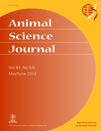
ANIMAL SCIENCE JOURNAL
Exploring Innovations in Agricultural and Biological SciencesAnimal Science Journal, published by Wiley, stands as a premier platform for advancing knowledge in the fields of Agricultural and Biological Sciences, Animal Science and Zoology, and Food Science. With an ISSN of 1344-3941 and an E-ISSN of 1740-0929, this journal not only enjoys a commendable Q2 ranking across multiple categories, reflecting its significance and impact within the academic community, but it also ranks within the top percentiles in terms of Scopus rankings. Operating out of the United Kingdom, the journal covers a broad spectrum of research topics relevant to animal science, encompassing both theoretical insights and practical applications. While it is not an open access journal, it remains an essential resource for researchers and practitioners eager to enhance their understanding of animal sciences, contribute to ongoing debates, and stay abreast of the latest findings from 2003 through 2024. Scholar engagement and innovative research are central to the journal’s objectives, making it an invaluable asset for students, professionals, and academics alike.
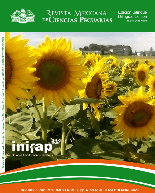
Revista Mexicana de Ciencias Pecuarias
Bridging Gaps in Animal Science for a Sustainable TomorrowRevista Mexicana de Ciencias Pecuarias, published by INIFAP-CENID PARASITOLOGIA VETERINARIA, is a prominent open-access journal since 2010 that caters to the fields of Animal Science and Veterinary Medicine. Based in Mexico, this journal addresses critical issues in animal health, production, and welfare, making it instrumental for researchers, professionals, and students seeking to advance their knowledge and practices. With an impact factor that reflects its growing influence, particularly in the Q3 quartile rankings in both Animal Science and Zoology as well as Veterinary (Miscellaneous) categories, the journal provides a vital platform for the dissemination of innovative research and findings. Additionally, its Scopus Ranks position highlights its role in publishing significant contributions to the fields of Veterinary Science and Agricultural Biology. The journal fosters a collaborative learning environment through its open-access model, ensuring that valuable insights are accessible to a wide audience. For those committed to enhancing animal well-being and advancing veterinary practices, the Revista Mexicana de Ciencias Pecuarias stands as a key resource through its rigorous peer-reviewed publication process and commitment to scientific excellence.

ZUCHTUNGSKUNDE
Empowering the future of breeding and genetics.ZUCHTUNGSKUNDE is a distinguished journal published by EUGEN ULMER GMBH CO that has been advancing the field of animal science and zoology since its inception in 1977. With its ISSN 0044-5401 and E-ISSN 1867-4518, this journal provides a vital platform for researchers, professionals, and students in the realms of animal genetics, breeding, and veterinary studies. Although currently categorized in the fourth quartile for both Animal Science and Zoology and Food Animals, ZUCHTUNGSKUNDE serves as an essential resource for sharing innovative research findings and methodologies. Located in Stuttgart, Germany, the journal is strategically positioned to foster collaboration within the European agricultural and biological sciences community. Researchers are encouraged to contribute their insights to enhance the understanding of breeding practices and improve animal welfare and productivity. Despite its challenges, ZUCHTUNGSKUNDE remains committed to addressing key issues within its scope, paving the way for future advancements in animal science.
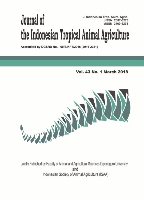
Journal of the Indonesian Tropical Animal Agriculture
Exploring Innovations in Tropical Animal ScienceJournal of the Indonesian Tropical Animal Agriculture is an esteemed peer-reviewed journal published by UNIV DIPONEGORO, focusing on the dynamic fields of animal science and veterinary medicine. Since its inception in 2009, the journal has maintained an open access policy, ensuring that valuable research is freely available to the global scientific community. Based in Indonesia, the journal has adapted to the evolving agricultural landscape and now contributes significantly to both local and international discourse on tropical animal husbandry. With a Scopus rank placing it within the 36th percentile for general veterinary sciences and the 25th percentile for animal science and zoology, it is emerging as a valuable resource for researchers and professionals alike. The journal covers a broad range of topics within its scope, fostering innovative approaches and solutions tailored to the unique challenges of the tropical environment. By exploring critical issues in animal agriculture, this journal not only enhances academic knowledge but also supports sustainable practices within the industry. We invite researchers, students, and professionals in the realm of veterinary science and animal agriculture to engage with the rich array of research presented in this journal.

CZECH JOURNAL OF ANIMAL SCIENCE
Connecting Scholars in Animal Science ExcellenceThe Czech Journal of Animal Science, published by the Czech Academy Agricultural Sciences, is a premier open-access journal dedicated to advancing research in the fields of animal science and zoology. With an impressive ranking of Q2 in its category for 2023, it underscores its significance within the academic community, evidenced by its Scopus rank of #197 out of 490 in Animal Science and Zoology, placing it in the 59th percentile among peers. The journal has been a crucial platform for scholarly communication since its inception and has embraced open access since 2004, ensuring that research is widely available to a global audience. Targeted toward researchers, professionals, and students, the journal publishes high-quality original research, review articles, and case studies that contribute to the understanding and enhancement of animal science practices. Its commitment to rigorous peer review and its broad scope undoubtedly solidify its role as an essential resource for those engaged in animal research and agriculture, fostering continued innovation and knowledge transfer in this vital sector.
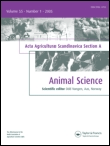
ACTA AGRICULTURAE SCANDINAVICA SECTION A-ANIMAL SCIENCE
Connecting Knowledge to Enhance Animal Health and WelfareACTA AGRICULTURAE SCANDINAVICA SECTION A-ANIMAL SCIENCE, published by Taylor & Francis AS, offers a vital platform for the dissemination of research in the field of animal science. With an ISSN of 0906-4702 and an E-ISSN of 1651-1972, this esteemed journal is based in the United Kingdom and covers critical studies pertaining to animal biology, production, and welfare. Although it operates under a non-open access model, the journal maintains a commendable position in the academic community, evidenced by its Q3 category ranking in both animal science and food animals for 2023, reflecting a sustained impact in these domains. Covering research from 1992 to 2018 and continuing from 2020 to 2024, the journal provides insights crucial for addressing contemporary issues in livestock production, veterinary sciences, and animal breeding. Researchers, professionals, and students alike will find this journal indispensable for enhancing their understanding and advancing the field of animal sciences.
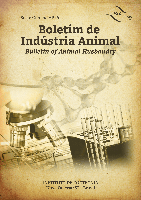
BOLETIM DE INDUSTRIA ANIMAL
Empowering Research for Sustainable Animal ProductionBOLETIM DE INDUSTRIA ANIMAL is a prominent academic journal dedicated to the field of animal industry, published by the Instituto de Zootecnia. As an Open Access journal since 1974, it provides a vital platform for researchers, professionals, and students to disseminate knowledge and advancements in animal production, husbandry, and veterinary sciences. With its commitment to enhancing the visibility and accessibility of research, BOLETIM DE INDUSTRIA ANIMAL encourages rigorous scientific inquiry and innovation within its community. The journal presents a rich repository of articles encompassing a wide range of topics related to animal science and industry practices. Published in Brazil and accessible globally, it aims to foster collaboration and knowledge exchange among scholars, ultimately contributing to the advancement of sustainable practices in the agricultural and animal husbandry sectors.

Animal Nutrition
Leading Research in Animal Nutrition and Food ProductionAnimal Nutrition is a premier open-access journal dedicated to advancing the understanding of nutritional science in animals, published by KEAI PUBLISHING LTD. Established in 2015, this journal has quickly risen to prominence within its field, securing a Q1 ranking in both Animal Science and Zoology and Food Animals as of 2023. With an impressive Scopus ranking, positioned first among 39 journals in Veterinary Food Animals and tenth among 490 in Agricultural and Biological Sciences - Animal Science and Zoology, it remains a critical resource for researchers, professionals, and students alike. The journal's commitment to open access ensures that cutting-edge research is readily available to a global audience, fostering the dissemination of knowledge that drives innovation in animal nutrition and health. With a focus on the intersection of animal physiology, dietary interventions, and food production systems, Animal Nutrition plays a pivotal role in shaping sustainable practices and improving animal welfare worldwide.
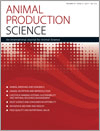
Animal Production Science
Transforming Animal Production for a Sustainable TomorrowAnimal Production Science, published by CSIRO PUBLISHING, is a prestigious journal that caters to the fields of Animal Science and Food Science. With an ISSN of 1836-0939 and an E-ISSN of 1836-5787, the journal features high-quality research and reviews that are crucial for advancing the understanding and innovation of animal production systems. Recognized within the Q2 category of both Animal Science and Zoology, and Food Science, as per the 2023 Journal Rankings, Animal Production Science has achieved commendable Scopus rankings, placing it in the 68th and 48th percentiles in its respective categories. With converged years from 2009 to 2024, and an aim to disseminate knowledge that promotes sustainable practices, the journal is pivotal for researchers, professionals, and students devoted to animal production and food security. Exploring topics from livestock management to food quality, the journal offers valuable insights for enhancing productivity while considering welfare and environmental impact. For those seeking accessibility, the journal provides various open access options, encouraging a wider reach of its scholarly articles.

Tropical Animal Science Journal
Elevating Standards in Tropical Animal ResearchTropical Animal Science Journal, ISSN 2615-787X, E-ISSN 2615-790X, is an esteemed open-access journal published by the Bogor Agricultural University, Faculty of Animal Science. Launched in 2018, this journal serves as a pivotal platform for disseminating high-quality research in the fields of Animal Science, Food Animals, and Veterinary Medicine. With its significant presence in Indonesia and a commitment to scientific innovation, it has achieved a Q3 ranking in Animal Science and Zoology and Food Animals, as well as a Q2 ranking in Veterinary (miscellaneous) as of 2023. The journal also enjoys favorable Scopus rankings, placing it in the 61st percentile for General Veterinary and demonstrating its relevance and impact in the academic community. As an advocate for open-access publishing since its inception, the journal enhances accessibility to critical research findings, making it an invaluable resource for researchers, professionals, and students alike who aim to advance their knowledge and contribute to the fields of tropical animal science.